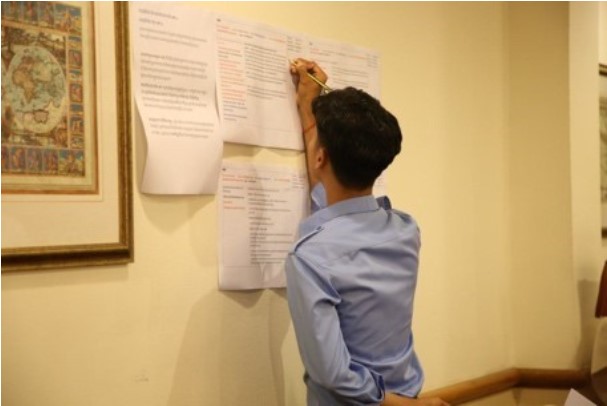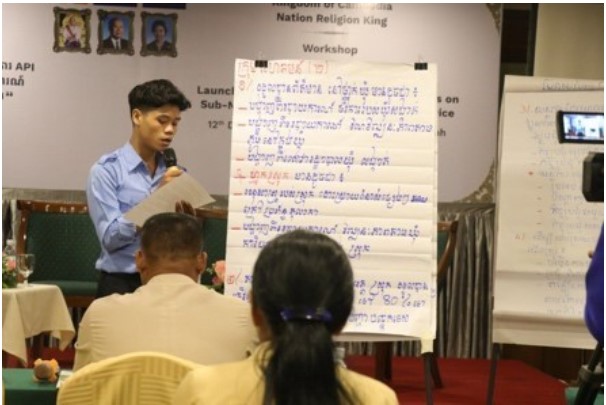This Project (2022-2023) was funded by DanChurchAid (DCA) and aimed at contributing to the fight against extreme poverty amongst rural communities. In particular, the activities focused on supporting 10 Community-based Organizations (CBOs), of which 5 operating in Pursat Province (3 CBOs in Phnom Krovanh district, 2 CBOs in Krong Pursat) and 5 in Banteay Meanchey Province (3 CBOs in Mongkul Borey district, 2 CBOs in Krong Srei Sophorn). The work aimed at creating the conditions for the communities to advocate by themselves with local and national authorities about their most stringent issues and grievances. This goal was addressed by training the CBOs’ leaders and members on advocacy techniques and dialogue participation, as well as informing the citizens on the benefits of using API-created apps and chatbots aimed at monitoring and evaluating the performance of local authorities and public service providers.
1) API supported the Kampeng Lake Conservation and Fishery Community (based in Kampeng village, Prongi commune, Phnom Krovanh district) consisting of 945 members (445 females). The community was able to raise with authorities several issues related to fishing offenses, lake water pollution, and community patrol funding. This community covers an area of 2 hectares.
2) API supported the Koul Toteung Forestry Community in 5 villages (Santre commune, in Phnom Krovanh district), with 1,392 members (695 females). The issues ranged from community deforestation, encroachment on privately-owned and community land. The Community’s land covers 328 hectares.
3) API supported the Samroung Forestry Community in Tades village (Samroung commune, Phnom Krovanh district) with 335 members (168 females). Their issues were community deforestation by outside loggers, since 2018 to the present. 20 hectares of community land have been lost, out of a total of 1,700 hectares.
4) API supported the Ou Thkov community forestry in Ou Thkov village (Sangkat Roleab, Krong Pursat) with 2,735 members (1,343 females). The issues were lack of funds to patrol 395 hectares of community forest and loggers cutting down about 30 trees a day in the community forest since 2021. The community lobbied the authorities and forestry administration to crack down on illegal logging and sought legal support to register as an eco-tourism site.
5) API supported the Dob Bath Development Agriculture Cooperative in Dob Bath village (Sangkat Lor Lork Sor, Krong Pursat) with 66 members (43 females). Their issues were lack of technical knowledge on mixing fertilizer with vegetable soil, resulting in low yields and lack of techniques for raising chickens and fish.
6) API supported the community of “People living with HIV together to build a new life” in Soeu village (Soeu commune, Mongkul Borey district) with 612 members 374 (females). Their main issues were the unethical behavior of the officials in charge of distributing antiretroviral drugs to patients, and the lack of funding for public and private hospital treatment, so the community had to advocate to secure social funding for free medical treatment.
7) API supported the Sambour Community Fishery is in Sambour village, Sambour commune, Mongkul Borey district with 639 members (372 female). Their issues are about perpetrators who continue to encroach on public lakes for the expansion of private businesses. Total land of 3,195 hectares: encroached 5 hectares.
8) API supported the Youth Unity Community Development in Srah Raing village (Srah Raing commune, Mongkul Borey district) with 20 members (12 females). The main issues were about the commune administration which did not disclose budget information (Commune Budget) to the citizens.
9) API supported the Phneat-Koh Pongsat Fishery Community in Neak Ta village (Sangkat Phneat, Krong Srei Sophorn) with 992 members (663 females). Their issues were related to community fisheries and lack of water in the dry season. Some private citizens had been using public water reserves for watering their rice fields and deforested parts of the local forests to expand their own property. The CBO requested support for patrolling the forest, such as torches, hammocks, and I-Com.
10) API supported the Ak Pi Rak Poch Trey Chamros Prohuot community in Pro Hout village (Sangkat Ou Ambel, Krong Srei Sophorn) with 150 members (65 females). Their issues were about individuals who continued to use nets, electric shocks, and other types of fishing devices to catch both large and small fish for business. The Community requested tools for guarding, such as solar lamps, lighters, hammocks, and I-Com.
All the above issues were discussed by community representatives with decision-makers, often with API mediation, through monthly commune/district councilors meetings, public fora, dialogue meetings with district governors, Budget, Procurement and Financial Management, and through policy dialogues organized by API at national level with key ministries and government stakeholders. The CBOs raised issues or concerns to the authorities and asked for their responses. 100% of the main issues were solved (for the 10 CBOs) with 2 advocacy issues completely solved and 8 advocacy issues partly solved.
The Youths Unity for Community Development (YUCD) is a community based in the Mongkul Borey District (Banteay Meanchey Province) with a vision to have more youth participation in community development. YUCD is led by Miss Thlok Longdy and has twenty members (twelve females). The formation of the group started in May 2023 on the initiative of young people who used not to care about any public affairs and never participated in any commune council (CC) activities in the past. However, after living in a place where there were plenty of rumors about their corrupted community and after witnessing the ineffective practices of the CC in Commune’s expenditures, these young people decided to do something together. At that time, API was conducting a training in the area, about Pidor Neak Phum Chlat Vey. The young people who participated in the training had very positive interactions with the API staff. By seeing the potential of the local youths, API decided to help a group of them to formalize the YUCD.


Participants of one of API-organized workshops for the Ta Khmao communities
The mission of this community is to encourage more youths to engage in Commune’s affairs, to initiate various activities to support the community, and to raise awareness about Commune’s investment and development budgeting. The first activity done by the group, was to disseminate the training about Pidor Neak Phum Chlat Vey. The training required the YUCD to recruit more youths and let them learn about public services available in the OWSO and OWSU and how to request the services. Later, there was an assignment from API to do a fundraising activity to help poor people in PoiPet City. This assignment could help the youths to think of whom they should ask for donations, including rice, noodles, and other seasoning products. The assignment was successfully achieved and stimulated those youths to want to do more.
The Youths Unity for Community Development group was trained by the Advocacy and Policy Institute (API) on how to advocate for their ideas, how to write reports, how to use facilitation skills, and how to write a budget plan for their Commune. They were also trained on how to use some technologies and how to take good photos and produce attractive videos. There was also some financial support (a transportation fee) for the YUCD’s members to participate in their Commune or District’s meetings. With close supervision from API, each member of the YUCD learnt to communicate with government officials during the meetings.
Even though the community was in the beginning stages of its existence, there have been some outstanding changes among the members of the community. The YUCD youths have been able to upgrade their soft skill capacity. They now know how to structure the process for advocating an idea, how to discuss problems, how to communicate with local authorities, and how to make an insightful presentation. Some of them took the opportunity provided by API to challenge themselves to be braver and talk in public. One youth reported that “API invited me to join a forum in Phnom Penh City. It was a great opportunity. I told myself to ask at least one question in the forum, even though I was really shaking. I could make it! I asked a few questions. Those kinds of things have stimulated me to do more. I really appreciate that.”
Such a kind of action not only raises confidence in the youths but also compels the local authority to trust the youths’ capacity and recognize their outstanding ability.
The project has also helped the members understand their rights and be brave enough to challenge the CC to publicly share Commune’s budget. The YUCD is currently working on lobbying the CC to transparently share the yearly income and expenditure with the public. One youth member said, “We are now asking how much the CC has spent over the year by printing out the detailed expenses on a piece of paper and sticking them in front of the Commune Administration. The CC agreed to do so, but I have never seen one so far. They said that the papers were destroyed by other people. We did not argue about that immediately because we could sense that the Mongkul Borey district’s governor was not happy about our request. We did not give further suggestions but to listen to what the District could do about budget transparency. Eventually they decide to post that paper and protect it with a glass wall in order to prevent any damages. We are waiting to see that.”
Besides that, the implementation of the Pidor Neak Phum Chlat Vey activity is seen as very successful in the community. It helps the YUCD to understand what the services available in the OWSO and OWSU are and their actual fees. The YUCD keeps spreading the information and encouraging local citizens in their area to use the Pidor. Most people had no idea about those services before, but the Pidor could help them a lot. They could also learn about supporting documents to bring along when they request services. It is helpful and easy.